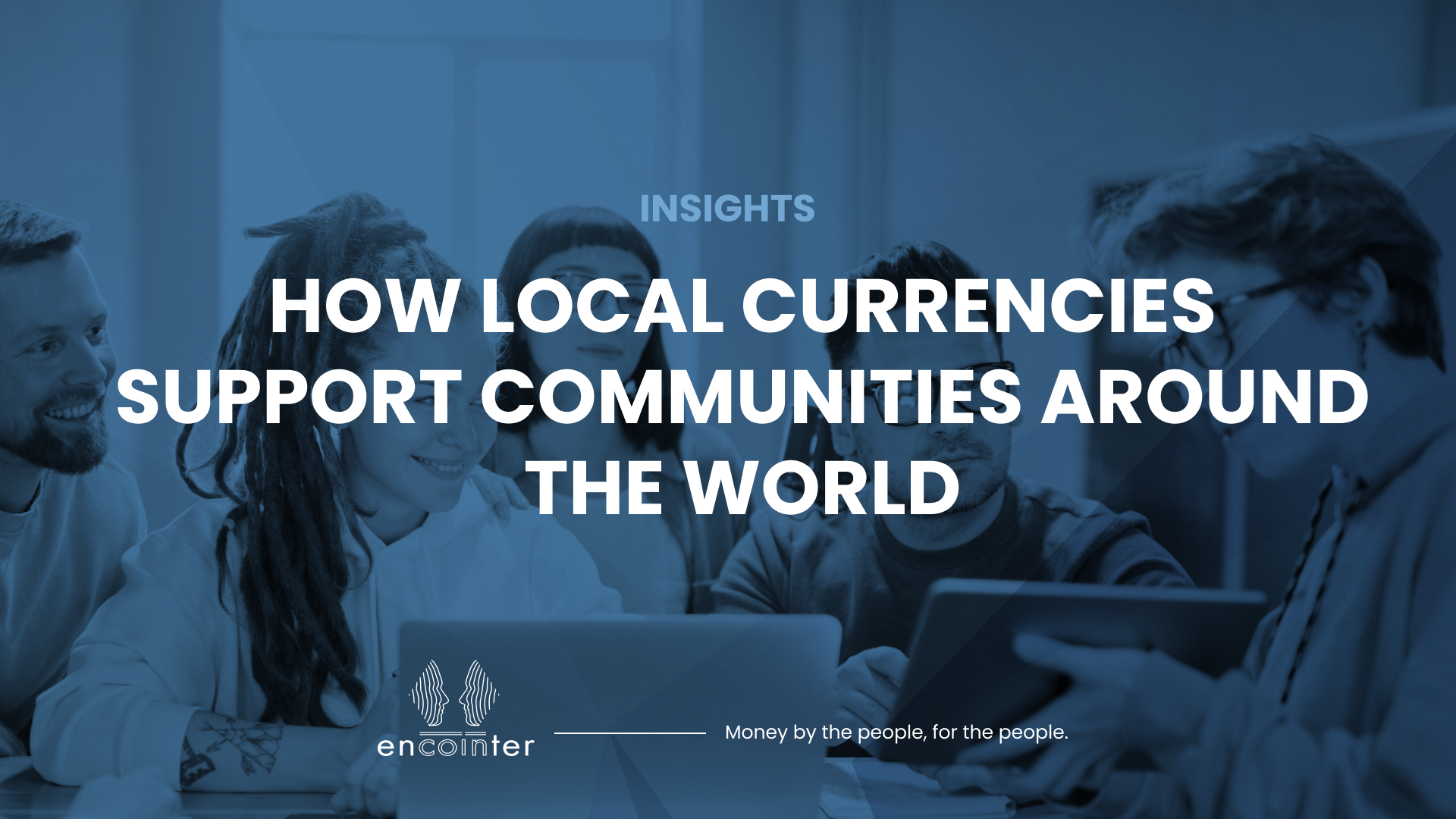How local currencies support communities around the world

“Buy local” has become one of the mantras used to push back against the tidal wave of globalization that has characterized most of the last five decades. However, the complexity of global supply chains and the ubiquity of international brands can make it difficult for people to know how much of their spending is really being channelled back into local communities. Local currencies, used within local communities as an alternative to national currencies, have become an increasingly popular way to resist the swell of globalized consumerism and promote local spending.
Local currencies can take different formats, but in their simplest form, participating shops and businesses agree to accept them for goods and services in the same way as cash. Community currencies may also be used by businesses to pay employees or suppliers. By limiting their use to local, independent businesses, local currencies aim to ensure that more of the value from any given purchase remains within the local community.
The economic benefits of increasing local spending can be considerable. One UK researcher estimates that businesses employing local people and buying from local suppliers generally return around three times as much to the local economy as those with a broader geographical dispersion.
There are other benefits. Where it’s possible to avoid shipping goods and raw materials from abroad, buying locally can also incur a lower carbon footprint. Furthermore, a thriving network of local businesses also offers community benefits. Local small businesses typically have more of an emotional investment in their neighborhoods, participating in events and charitable initiatives.
Community currencies have become popular as a way of helping people to ensure their money is being spent in a way that provides maximum benefit to the local community. Many initiatives have emerged in different formats across the globe, with varying degrees of success.
Túmin – Mexico
Túmin, meaning “money” in the language of Mexico’s indigenous Totonaca people, was started in 2010 in the state of Veracruz by a local academic, Juan Castro. Recognizing that local grocery markets were struggling to compete with the increasing presence of large companies, Castro launched Túmin as a way of helping indigenous farmers stimulate sales through lower costs, as the “Túministas” sell at a discount when the customer pays with Túmin.
Twelve years later, and it’s still in operation, reportedly now expanded to 24 of Mexico’s 32 states. However, there are some barriers to acceptance. One taxi driver stated that only a few customers chose to pay in Túmin, and many people wouldn’t accept change in Túmin notes, considering it foreign.
Bristol Pound – United Kingdom
The Bristol Pound was launched by economic activists in 2012 as a way of protecting the independent shops and businesses in Bristol, a port city in the west of England. Anyone could buy Bristol Pounds – colorful vouchers designed by local residents, and spend them at any of 650 participating businesses. It grew to become the largest community currency in the UK, which has had around a dozen such initiatives.
In 2020, the project unfortunately folded due to a lack of funding as it found itself unable to compete with the rise of cashless payments and digital currencies once the pandemic hit. It’s now developing a new electronic local payment initiative called Bristol Pay, although details have yet to be announced.
Bangla-Pesa – Kenya
The Bangla-Pesa aims to support residents of Bangladesh – not the south Asian country, but an economically deprived neighborhood of the same name in Mombasa, Kenya. In developing countries, such neighborhoods often have their own local economies, which can be extremely volatile. During the time of the month when workers receive their wages, the economy is buoyant, and local vendors can make enough to sustain themselves. However, in the days before payday, people are buying a lot less, meaning local businesses can’t rely on continuous trade to maintain their livelihoods.
The Bangla-Pesa is designed to help people maintain a pipeline of necessities even during the downtimes. Residents receive Bangla-Pesa’s as a voucher to meet their excess needs, increasing trade and overall market efficiency. One 2020 study found that local currencies tend to be particularly effective in these circumstances where the supply of money fluctuates frequently, by providing a more stable medium of exchange.
In recent years, Bangla-Pesa has been rolled up into the Sarafu Network, a Kenya-wide digital community currency initiative based on blockchain technology.
WIR – Switzerland
WIR is one of the world’s longest-running community currencies, set up in Switzerland in 1934. WIR is short for the German term Wirtschaftsring (“economic circle”), although wir also translates to “we.” Unlike the other community currencies we’ve described here, WIR is a business-to-business settlement mechanism rather than a currency aimed at local residents. It offers a way for Swiss SMEs to buy and sell from one another without using the Swiss Franc.
WIR was established by a group of Swiss business leaders following the inter-war financial crises as a way to protect companies from the effects of any future economic downturn. It obtained bank status in 1936 and in 1999 began offering local currency services under the ticker CHW to its 50,000 members.
There are no physical CHW – all funds are created or destroyed based on credit agreements and managed via members’ electronic accounts administered by the WIR Bank.
Banco Palmas – Brazil
Banco Palmas is a community currency founded in 1998 to support residents of the Palmeira neighborhood in Fortaleza, Brazil. The bank offers loans in the palma currency, which is pegged 1:1 with the Brazilian real. As many of the community residents are unbanked, Banco Palmas doesn’t work on a credit scoring system or requires documentation like identity documents. Instead, residents can vouch for one another, creating a collaborative and community-driven approach.
Banco Palmas saw significant success during its first decade and a half, reversing a prevalent trend where around 80% of purchases were made outside of the Palmeira neighborhood outside the neighborhood. By 2011, 93% of inhabitants’ purchases were made within the district. The initiative led to the establishment of a network of community banks across Brazil.
How Encointer primes community currencies for success
As these examples illustrate, community currencies can be very effective in helping to boost local economies, but they aren’t always successful. Paper-based currencies are expensive to administer and are becoming largely redundant in the age of digital payments. However, digital currencies can still cost money to operate, and there are important considerations around maintaining digital accounts and identity management. Adoption is also a challenge – many currencies struggle to get local buy-in, and those that do then run into the issue of scalability and the ability to meet demand.
Currently, there is a lack of out-of-the-box solutions that would help community leaders to get a local currency up and running without reinventing the wheel each time. This is where Encointer comes in. Our blockchain platform allows anyone to issue a token-based currency for use in their location, and begin inviting people to join using the Encointer app. Each participant will receive a QR code representing their unique blockchain identity.
Participants can join any given community currency either by accepting payment for goods and services in the currency or attending regular meetups. At the meetups, members will validate one another’s identity to receive an allocation of the community-issued income. Currencies on Encointer are subject to demurrage, which means that if you store it in an account, the value will decrease each month. This mechanism promotes spending, ensuring that the currency is doing its job within the community. Encointer’s platform is safe, secure, and easy for anyone to use with only a smartphone app.
If you’re interested in finding out more about how Encointer’s local currencies could help boost spending and promote social inclusion in your community, then contact us today for a chat.

